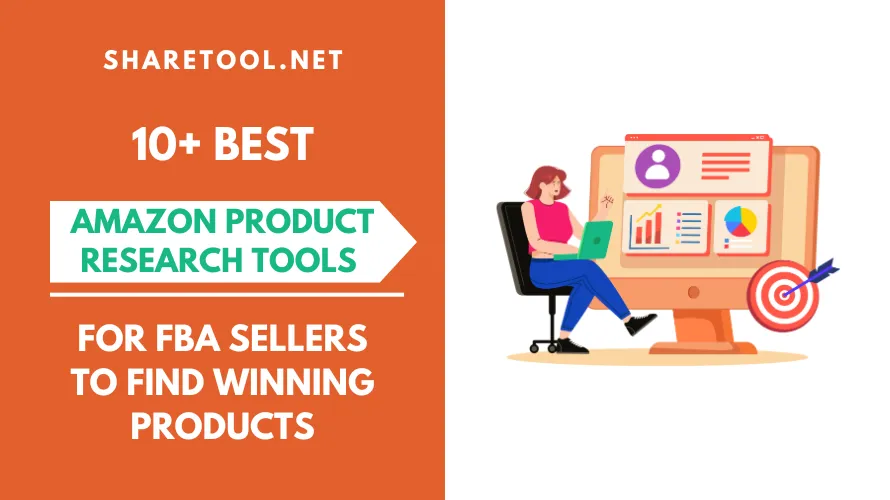10+ Best Amazon Product Research Tools For FBA Sellers To Find Winning Products
Amazon product research tools are the secret weapon FBA sellers use to uncover winning products in a sea of competition. With over 12 million items already listed on Amazon and thousands of new sellers joining every day, finding profitable opportunities can feel impossible without the right tools.
Instead of guessing, these platforms give you hard data – search volume, competition analysis, and profit margins – so you can make smarter decisions. For FBA sellers, that difference often means launching a bestseller instead of wasting time and money on the wrong product.
In this guide, we’ll break down the 10+ best Amazon product research tools for FBA sellers, compare their features, and show you how successful sellers use them to consistently discover products that drive sales and build sustainable businesses.
Why Amazon Product Research Tools Are Essential for FBA Success
Before diving into specific tools, it’s crucial to understand why manual product research simply doesn’t cut it anymore. The Amazon marketplace generates massive amounts of data every second – sales figures, keyword search volumes, competitor pricing, review patterns, and inventory levels. Processing this information manually would take weeks, and by the time you finish your analysis, market conditions would have already changed.

A quality product research tool for Amazon automates this data collection and analysis, providing you with real-time insights that enable quick decision-making. These tools help you identify products with high demand but low competition, estimate profit margins, track competitor performance, and validate product ideas before you invest money in inventory.
Top 10 Amazon Product Research Tools: Comprehensive Analysis
BookBeam – Specialized Book Publishing Intelligence
BookBeam stands out as a specialized Amazon product research tool designed specifically for book publishers and authors looking to succeed in Amazon’s massive book marketplace. This tool focuses exclusively on book market analysis, making it invaluable for anyone in the publishing industry.

Key Features:
- Real-time book sales data and rankings
- Competitor analysis for book categories
- Keyword research for book titles and descriptions
- Profit margin calculations for different book formats
- Market trend analysis for publishing niches
Pros:
- Highly specialized for book market research
- Accurate sales estimates for book products
- User-friendly interface designed for publishers
- Affordable pricing for independent authors
Cons:
- Limited to book products only
- Smaller user community compared to general tools
- Less frequent updates than major competitors
Best For: Authors, publishers, and entrepreneurs focusing on Amazon’s book marketplace
Helium 10 – The All-in-One Amazon Research Powerhouse
Helium 10 has established itself as one of the most comprehensive Amazon FBA product research platforms available. This suite of tools covers every aspect of Amazon selling, from initial product research to listing optimization and inventory management.

Key Features:
- Black Box product database with advanced filtering
- Xray Chrome extension for real-time Amazon data
- Keyword research and tracking tools
- Listing optimization recommendations
- Inventory management and alerts
Pros:
- Comprehensive suite covering all Amazon selling aspects
- Accurate data with frequent updates
- Strong community and educational resources
- Chrome extension for quick research
Cons:
- Expensive for beginners
- Steep learning curve due to feature complexity
- Some features require higher-tier subscriptions
Best For: Serious Amazon sellers who want an all-in-one solution
Pexda – Advanced Market Intelligence Platform
Pexda offers sophisticated market analysis tools that go beyond basic product metrics. This best Amazon product research tool provides deep insights into market trends, seasonality patterns, and competitive landscapes.

Key Features:
- Advanced product opportunity scoring
- Seasonality and trend analysis
- Competitive intelligence dashboard
- Custom market reports
- API access for advanced users
Pros:
- Sophisticated data analysis capabilities
- Excellent trend prediction features
- Customizable reporting options
- Strong API for integration
Cons:
- Higher price point than basic tools
- Requires data analysis skills to maximize value
- Limited customer support channels
Best For: Data-driven sellers who need advanced analytics
Viral Launch – Market Intelligence with Launch Support
Viral Launch combines product research with launch optimization tools, making it ideal for sellers who want to research products and successfully launch them. This Amazon seller product research tool includes unique features for product launches and market penetration.

Key Features:
- Market Intelligence for product discovery
- Kinetic PPC management tools
- Split testing for listings
- Launch optimization services
- Brand analytics and monitoring
Pros:
- Strong product launch support features
- Accurate market intelligence data
- Integrated PPC management tools
- Good educational content
Cons:
- More expensive than research-only tools
- Complex interface for beginners
- Some features locked behind higher tiers
Best For: Sellers planning product launches with marketing support
Merch Informer – Print-on-Demand Research Specialist
Merch Informer specializes in research for Amazon’s print-on-demand platforms, particularly Merch by Amazon. This niche Amazon product research tool free tier option provides valuable insights for t-shirt and merchandise sellers.

Key Features:
- Merch by Amazon trending designs analysis
- Keyword research for merchandise
- Competition analysis for print products
- Sales estimation for POD products
- Trademark and copyright checking tools
Pros:
- Specialized for print-on-demand market
- Affordable pricing with free tier
- Good trademark checking features
- Active community for POD sellers
Cons:
- Limited to print-on-demand products
- Smaller database compared to general tools
- Basic interface design
Best For: Print-on-demand sellers and merchandise entrepreneurs
ZonGuru – User-Friendly Research with Strong Analytics
ZonGuru positions itself as a user-friendly alternative to more complex research platforms. This best software for Amazon product research focuses on simplicity while maintaining comprehensive data coverage.

Key Features:
- Niche Rater for product opportunity scoring
- Chrome extension for quick research
- Keyword research and tracking
- Sales analytics and forecasting
- Inventory management tools
Pros:
- Intuitive, beginner-friendly interface
- Competitive pricing structure
- Good customer support
- Regular feature updates
Cons:
- Smaller feature set than premium competitors
- Limited advanced analytics options
- Newer company with less market presence
Best For: Beginners and sellers who prefer simple, effective tools
Sell The Trend – Winning Product Discovery Platform
Sell The Trend focuses on identifying trending products across multiple platforms, including Amazon. This free Amazon product research tool option helps sellers spot emerging opportunities before they become saturated.

Key Features:
- Trending product discovery across platforms
- Social media engagement analysis
- Supplier connection features
- Video ad creation tools
- Market saturation analysis
Pros:
- Multi-platform trend analysis
- Good for finding emerging opportunities
- Includes supplier sourcing features
- Free tier available
Cons:
- Less Amazon-specific than dedicated tools
- Limited depth of Amazon data
- Focus on trending rather than evergreen products
Best For: Dropshippers and sellers looking for trending products
AmzChart – Simple Analytics with Essential Features
AmzChart provides straightforward Amazon analytics without overwhelming users with complex features. This Amazon product keyword research tool focuses on essential metrics that matter most to sellers.

Key Features:
- Product sales tracking and analytics
- Keyword ranking monitoring
- Competitor analysis tools
- Price tracking and alerts
- Basic market research capabilities
Pros:
- Simple, focused feature set
- Affordable pricing
- Good for tracking existing products
- Easy to learn and use
Cons:
- Limited product discovery features
- Basic interface design
- Smaller database than major competitors
Best For: Sellers who want simple tracking and monitoring tools
SmartScout – Amazon Market Intelligence Platform
SmartScout offers comprehensive market intelligence with a focus on brand analysis and category research. This how to research products to sell on Amazon tool provides unique insights into brand performance and market opportunities.

Key Features:
- Brand and category analysis tools
- Market size estimation and trends
- Competitor tracking and alerts
- Product opportunity identification
- Amazon advertising insights
Pros:
- Strong brand analysis capabilities
- Comprehensive market intelligence
- Good category research features
- Competitive advertising insights
Cons:
- Higher learning curve
- Premium pricing structure
- Limited beginner resources
Best For: Advanced sellers and agencies managing multiple brands
Additional Free Amazon Product Research Tools
While premium tools offer the most comprehensive data, several Amazon product research tool free options can help beginners get started:
- Amazon Best Sellers Lists: Track trending products in different categories
- Google Trends: Identify seasonal patterns and growing interest
- Amazon’s Own Data: Use Amazon’s search suggestions and competitor analysis
- Social Media Monitoring: Track product mentions and reviews across platforms
These free tools require more manual work but can provide valuable insights for sellers on a tight budget.
Comprehensive Tool Comparison Table
| Tool | Key Strengths | Pricing Range | Best For |
|---|---|---|---|
| BookBeam | Book market specialization | $10/month | Publishers & Authors |
| Helium 10 | Complete Amazon toolkit | $20/month | Serious Amazon sellers |
| Pexda | Advanced analytics | $35/year | Data-driven sellers |
| Viral Launch | Launch optimization | $119/year | Product launchers |
| Merch Informer | POD specialization | $10/month | Print-on-demand sellers |
| ZonGuru | User-friendly interface | $45/year | Beginners |
| Sell The Trend | Multi-platform trends | $8/month | Trend followers |
| AmzChart | Simple tracking | $8/month | Basic monitoring |
| SmartScout | Brand intelligence | $250/year | Advanced users |
| Free Tools | Budget option | $0 | Bootstrapping sellers |
Step-by-Step Checklist: How to Choose Your Amazon Product Research Tool
Selecting the right Amazon product research tool depends on your specific needs, budget, and experience level. Use this checklist to make an informed decision:
Define Your Research Goals
- Determine if you need product discovery, competitor tracking, or both
- Identify your primary product categories or niches
- Consider whether you need launch support or just research data
Assess Your Budget
- Calculate how much you can afford monthly for research tools
- Consider the ROI potential of premium features
- Look for free trial options to test before committing
Evaluate Your Technical Skills
- Choose tools that match your data analysis comfort level
- Consider whether you need simple dashboards or complex analytics
- Determine if you want all-in-one solutions or specialized tools
Research Data Accuracy
- Read reviews from verified users about data quality
- Test accuracy with products you already know well
- Compare data between multiple tools when possible
Consider Integration Needs
- Check if tools integrate with your existing systems
- Evaluate API access for custom implementations
- Consider Chrome extensions for workflow efficiency
Review Support and Education
- Assess quality of customer support channels
- Look for educational resources and training materials
- Consider community size and activity levels
Test Multiple Options
- Sign up for free trials of top contenders
- Use actual products for testing, not just demos
- Compare ease of use and feature accessibility
Free Amazon Product Research Strategies
While premium tools offer significant advantages, you can still conduct effective Amazon FBA product research using free methods. Here’s how to maximize free resources:
Amazon’s Built-in Data Sources:
- Start with Amazon’s own data by analyzing best seller lists, new releases, and movers & shakers sections. Use the search bar’s auto-complete suggestions to identify popular keywords and product variations.
Google Trends and Keyword Planner:
- These free Google tools help identify seasonal trends and search volume patterns. Cross-reference Amazon product ideas with Google search data to validate demand.
Social Media Intelligence:
- Monitor Facebook groups, Reddit communities, and Instagram hashtags related to your target niches. Look for products that generate high engagement and discussion.
Manual Competitor Analysis:
- Study top-performing listings in your target categories. Analyze their pricing, features, reviews, and marketing strategies to identify gaps and opportunities.
How To Do Effective Product Research for Amazon
Understanding how to do product research for Amazon effectively requires a systematic approach that combines data analysis with market intuition. Here’s a proven methodology:
Step 1: Market Size Analysis
Use your chosen research tool to identify categories with adequate demand but manageable competition. Look for markets with at least 1000 monthly searches but fewer than 100 direct competitors.
Step 2: Profit Margin Calculation
Factor in all costs including product cost, Amazon fees, shipping, and marketing. Aim for products that can maintain at least 30% profit margins after all expenses.
Step 3: Competition Assessment
Analyze the top 10 competitors in your target niche. Look for opportunities where existing products have poor reviews, limited variations, or weak marketing.
Step 4: Seasonality Evaluation
Understand the seasonal patterns of your target products. Avoid products with extreme seasonality unless you have strategies to manage inventory fluctuations.
Step 5: Sourcing Feasibility
Research potential suppliers and manufacturing costs. Ensure you can source products reliably and maintain quality standards.
Advanced Amazon Product Research Strategies
For sellers ready to move beyond basic research, these advanced strategies can provide competitive advantages:
Brand Gap Analysis:
- Use tools like SmartScout to identify categories where established brands have weak presence. These gaps represent opportunities for new brands to establish market position.
Review Mining:
- Analyze competitor reviews using natural language processing to identify common complaints and desired features. This reveals product improvement opportunities.
Keyword Trend Correlation:
- Cross-reference product performance with keyword trend data to predict future demand patterns. This helps with inventory planning and product development.
International Market Expansion:
- Research product performance across different Amazon marketplaces to identify expansion opportunities. Products successful in one market may work in others.
Conclusion – Transform Your Amazon Business With The Right Research Tools
Choosing the right Amazon product research tools is one of the most important decisions you’ll make as an FBA seller. Success often comes down to the quality of your product selection and quality requires accurate data.
Whether you start with free options to test the waters or upgrade to powerful platforms like Helium 10 or Viral Launch, the key is consistent, data-driven research. Combine these insights with your own market knowledge, and you’ll dramatically increase your chances of finding your next winning product.
Ready to gain access to premium research tools without the premium cost? Visit Share Tool today to explore group-buy deals that put the best Amazon product research tools within reach, so you can save money, save time, and focus on scaling your business.
- Top 10 Best WordPress Plugins For Design To Create Stunning Layouts
- Top 5+ Best AI Email Assistants To Increase Your Email Open Rates
- Best 10+ AI Writing Tools For Students To Improve Grammar And Writing Clarity
- 10+ Best TikTok Ads Spy Tools For Influencers To Discover Viral Ad Trends
- Top 10 Best Creatopy Alternatives For Stunning Designs








